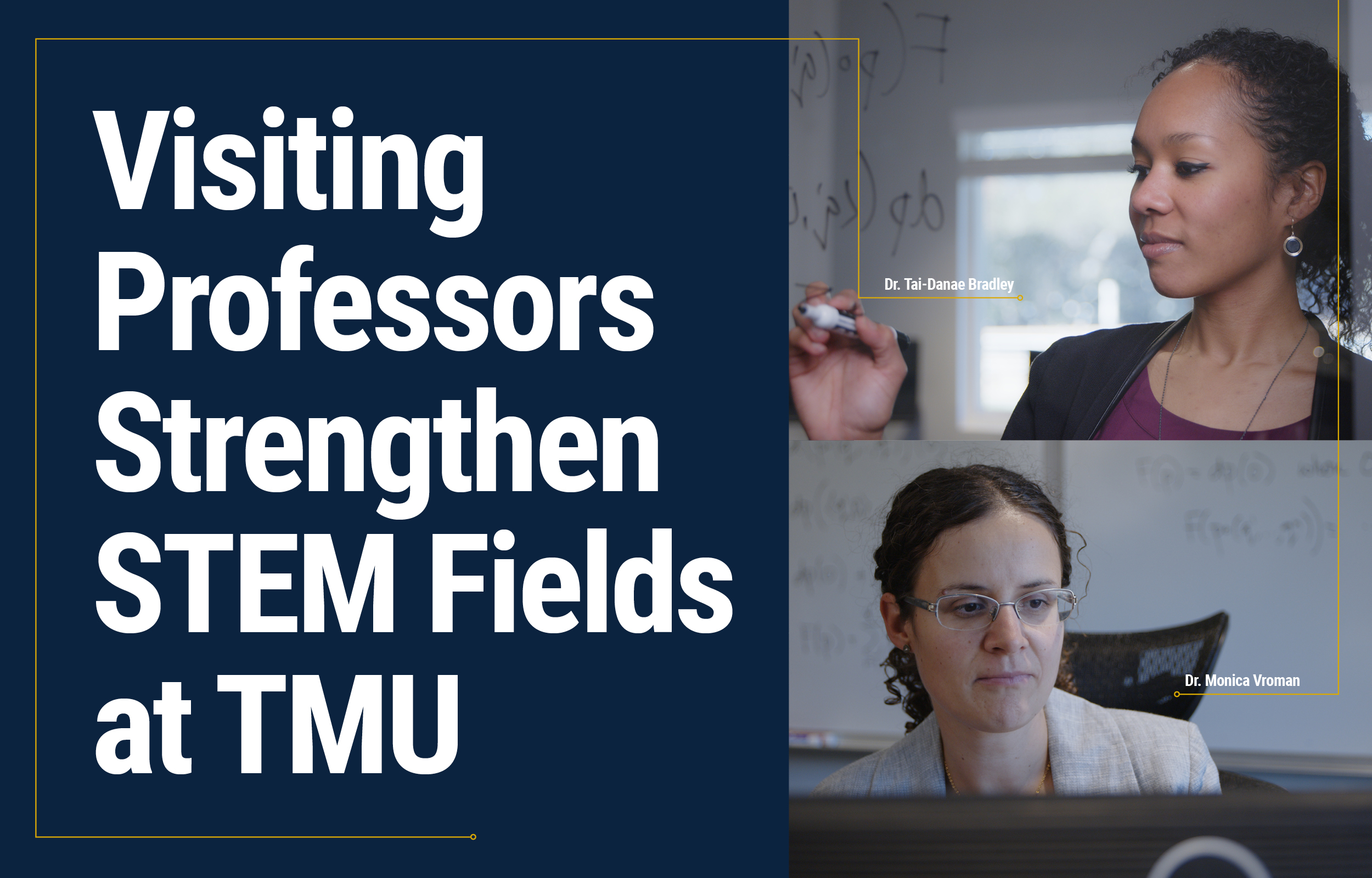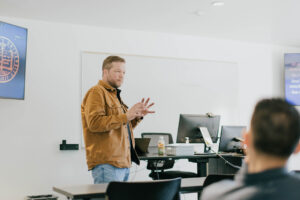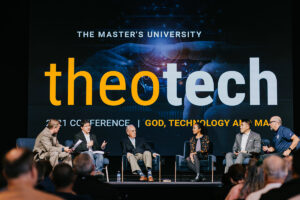
Editor’s Note: This story originally appeared in the March issue of The Mustang Connection magazine.
On separate Sunday mornings, a computer science expert from Romania and an East Coast mathematician walked into Grace Community Church in Sun Valley, California. As a result, they both now work at The Master’s University as visiting professors.
STEM (science, technology, engineering and math) at TMU may never be the same.
Under the umbrella of TMU’s School of Science, Mathematics, Technology & Health, Dr. Monica Vroman and Dr. Tai-Danae Bradley have their dream jobs. The University, in turn, has added two teaching and researching powerhouses who have been instrumental in the recent expansion of its computer science and engineering programs. These additions to an already impressive and high-caliber faculty in the STEM fields represent a new era of growth.
As a new believer, Monica Vroman originally traveled to the U.S. from Romania to study computer science at Rutgers University in New Jersey. She stayed because she fell in love with an American named Dave.
Monica’s graduate research was on imitation learning – the art of teaching computers to learn through observation. After graduating and marrying Dave, she lent her expertise to a fellow Rutgers graduate doing research into improving computer science education. But for the most part, her academic credentials in machine learning were left on the shelf as she focused on working at home.
Then, in 2015, the Vromans moved to Los Angeles so that Dave could attend The Master’s Seminary.
The couple began attending Grace Community Church. And though Dr. Vroman was humble about her credentials, word finally reached Dr. John MacArthur that one of his congregants had serious chops in the realm of STEM. In 2020, he alerted Prof. David Crater, another Grace Community member and the newly-hired chair of TMU’s Department of Engineering and Computer Science.
Of particular interest to Crater was Vroman’s background in machine learning.

David Crater, chair of the engineering and computer science department, has helped expand the STEM fields at TMU by working to build three engineering programs.
At the time, Crater was working passionately toward his dream of starting an artificial intelligence emphasis at TMU. And according to Crater, the three biggest subfields of A.I. are computer vision, natural language processing and machine learning. The first fell within the wheelhouse of Dr. John Eickemeyer, a longtime TMU faculty member. The second was Crater’s specialty. Vroman filled the missing third piece of the puzzle.
She was not hard to convince.
“TMU is my dream job,” she says. “I knew that The Master’s University stood for excellence in teaching and was solid biblically. It was just a perfect combination. I didn’t know anything about the computer science department. But I thought that teaching at TMU would be a dream because you could really do your best in teaching and in using the abilities the Lord has given you, while doing it for the Lord.”
In the fall of 2020, Vroman began teaching her Machine Learning course. This enabled Crater to create his hoped-for AI emphasis.
While this was happening, a certain mathematician was doing a postdoc for X, the Moonshot Factory (previously called Google X). Dr. Tai-Danae Bradley hadn’t always planned to have an academic career in math, but she’d fallen in love with it after a great calculus teacher helped her see the underlying concepts behind the formulas. These concepts, in turn, pointed her to the author of mathematics.
“The more I learned about mathematics, the more it just endeared the Lord to me,” Bradley says. “I mean, there’s so much beauty and order and precision, and you see His genius in creation through mathematics.”
Her graduate studies in pure math at the City University of New York led to a dissertation exploring mathematical structure in language, bringing her into contact with AI and machine learning. This expertise drew the interest of X, which gave her a new avenue for her research once she finished her program.
Meanwhile, Bradley and her father, James, were struggling to find a solid, biblically faithful church where they lived in New York City. They watched Grace Community Church’s livestream to fill the gap. They also prayed for an opportunity to travel to California to attend Grace Church on a Sunday morning. In January 2021, they finally got the chance. That Sunday, MacArthur received word that there was a visitor with strong math credentials. Once again, he found and forwarded her resume to Crater.
“The next morning, I woke up to an email from David Crater at TMU,” Bradley says. “Basically, it said, ‘Hey, we heard about your work and heard that you’re in town. I just wanted to reach out and see where this conversation leads.’”
As it turned out, the conversation led to Bradley visiting TMU’s campus in March. She participated in a Q&A and guest-lectured for multiple courses.
“It was such a great trip because I got to meet everyone and see the beautiful campus and interact with the students for the first time,” she remembers.
One of the people she met was Vroman.
“She was guest-lecturing in my class,” Vroman says, “and I asked her, ‘What’s your dream job?’ And she said, ‘Creating a research institute where believers would be free to take science where it needs to go.’
“In other contexts, you aren’t able to say, ‘I think that my discoveries lead to a Creator – a good and a kind Creator who is also holy and just.’ You can’t say that, because it’s established in the scientific community that evolution is the way life happened. A lot of us who have done science in secular environments know that we aren’t free to speak about where our discoveries take us. So she had this vision of an institute where scientists would be free to take science where it leads, which is to God.”
After the visit, Crater and Bradley stayed in touch, talking through her vision for a research institute. Eventually, they pitched the idea to TMU’s leadership and received the funding, and Bradley came aboard as a visiting professor starting in fall 2021.
“To have this opportunity at TMU is better than anything I could have ever imagined. This is definitely Ephesians 3:20 – ‘beyond all we can ask or think,’” Bradley says. “It’s amazing to me to see it crystalizing. I wake up and I’m like, ‘Am I still dreaming? This can’t be real.’”
This new institute, called The Math3ma Institute, has already launched multiple projects, including an expository STEM journal, a public lecture series and a faculty blog. Across all of these, Bradley’s hope is to communicate research topics in a way that’s approachable for laypeople.
“We’re slowly building up a body of work that is going to do several things,” Bradley says. “It’s going to help stimulate more research activity on this campus. It’s going to put some great content out there about cutting-edge topics. It’s going to provide an extra measure of publicity and scholarly weight for us in the community at large, and especially for potential students and their families. And it’s going to, we hope, glorify the Lord in all these things.”
And the institute is just one expression of the overall movement to expand STEM at TMU. Though the University has long had computer science and biological science programs, Crater has worked to build three new engineering programs in addition to the new AI emphasis. He has also spearheaded TMU’s new annual TheoTech conference, an event designed to explore STEM topics through a biblical lens.

Bradley was a featured speaker at TMU’s TheoTech conference in October 2021 along with, left to right, David Crater, Abner Chou, John MacArthur, Joey Kim and Joe Francis.
Crater explains, “This will bring in new categories of students to TMU: engineering and AI-leaning students who will be able to participate in things with The Math3ma Institute, engage in new research projects with faculty, and perhaps publish in The Math3ma Journal. We hope that, over the next five years, this increases into a sizable and meaningful new type of activity on campus.”
The engineering and computer science department is already seeing the fruit of these new initiatives. In 2021, the department had 25 students. This year, it has more than 50. Next year, Crater expects to have over 70 – meaning the department is on track to triple over the course of two years. But this rapid growth isn’t necessarily a surprise.
“These fields, both in industry and in academia, are growing at rates of 7-10% a year,” Crater says. “They’re in high demand. As Dr. MacArthur put it to me when he and I were first talking about this, there’s a whole segment of potential students and their families that we weren’t really serving, because we weren’t really involved in these fields. Now that we are involved in these fields, there is a whole new category of people who are interested in TMU.”
Plans for the future include more public lectures, more issues of the journal, outfitted labs for mechanical, electrical and computer engineering, and expanded student research opportunities.
“To see it grow and flourish has been amazing,” Vroman says. “I’m very privileged to be part of it.”
Bradley, who is heavily involved in many of these plans for the future, says, “It’s a lot of work. But this is like my dream come true, so it doesn’t really feel like work. This is so fun for me.”
Find more information about engineering and computer science at TMU here.

The Master’s University and Seminary admit students of any race, color, national and ethnic origin to all the rights, privileges, programs, and activities generally accorded or made available to students at the school. It does not discriminate on the basis of race, color, national and ethnic origin in the administration of its educational policies, admissions policies, scholarship and loan programs, and athletic and other school-administered programs.
© 2025 The Master’s University Privacy Policy Copyright Info
| Cookie | Duration | Description |
|---|---|---|
| cookielawinfo-checkbox-analytics | 11 months | This cookie is set by GDPR Cookie Consent plugin. The cookie is used to store the user consent for the cookies in the category "Analytics". |
| cookielawinfo-checkbox-functional | 11 months | The cookie is set by GDPR cookie consent to record the user consent for the cookies in the category "Functional". |
| cookielawinfo-checkbox-necessary | 11 months | This cookie is set by GDPR Cookie Consent plugin. The cookies is used to store the user consent for the cookies in the category "Necessary". |
| cookielawinfo-checkbox-others | 11 months | This cookie is set by GDPR Cookie Consent plugin. The cookie is used to store the user consent for the cookies in the category "Other. |
| cookielawinfo-checkbox-performance | 11 months | This cookie is set by GDPR Cookie Consent plugin. The cookie is used to store the user consent for the cookies in the category "Performance". |
| viewed_cookie_policy | 11 months | The cookie is set by the GDPR Cookie Consent plugin and is used to store whether or not user has consented to the use of cookies. It does not store any personal data. |
Notifications
